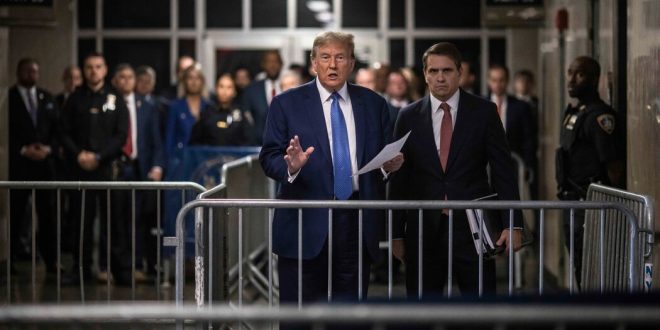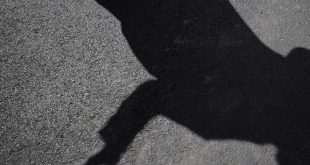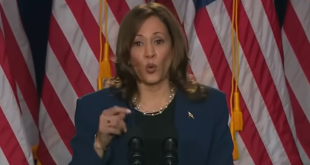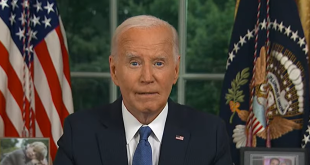There are a lot of rules in Courtroom 1530 inside the Manhattan Criminal Courts Building, many of which are posted next to the swinging entry doors.
Food and beverage are not permitted in the courtroom. Neither is the reading of a newspaper. Beepers and telephones are not to be turned on.
But nowhere does it say you have to keep your eyes open. So, often, former President Donald Trump does not.
Today, I’m writing from overflow courtroom just down the hallway from where Trump is standing trial in a sex scandal coverup case. I’m squeezed onto a wooden bench with my colleagues watching something only a few Americans have actually seen: the closed-captioned video feed of Trump’s criminal trial.
And I saw something I had never seen: a totally quiet and calm Trump, eyes closed, seemingly content to let it all pass him by.
It was a jarring departure from the combative figure we have come to know from the White House, the campaign trail and the courthouse halls. Trump regularly marches up to the cameras in the hallway during breaks and slams the whole affair as “election interference.” On his way out of court, he called the judge a “tyrant.”
But where there is usually noise, today, at the defense table, there was silence. Where Trump often tries to fill the physical space in front of a camera or behind a lectern, today he leaned back in his chair, even slumped. And where he is usually, obviously watchful, he closed his eyes, looking either like he was meditating on the proceedings — or ignoring them altogether.
My colleague Maggie Haberman, who has covered every day of the trial, made the widely noted observation on the very first day that Trump appeared to have nodded off. So I asked her whether what I was witnessing was the result of an unusually mundane day at court — or, if this was typical.
Trump, she said, has closed his eyes for a more sustained period of time than any defendant she has ever seen.
“He isn’t always sleeping when his eyes are shut,” she said, “but he certainly is sometimes. And he was the first week, during jury selection. Some of it seems to be a way for him to compartmentalize.”
He’s visibly bored, Maggie said. And he’s also angry.
Through binoculars borrowed from my colleague Susanne Craig, I watched Trump’s impassive posture as his lawyers grilled Michael Cohen, a star witness who testified that he made a hush-money payment to the porn actress Stormy Daniels for which Trump later reimbursed him. Trump is accused of falsifying business records to cover up his reimbursement.
The former president’s lawyers spent much of the day trying to poke holes in Cohen’s testimony, forcing him to admit that he stole tens of thousands of dollars from the Trump organization, and that he has made several million dollars on podcasts and books since he turned on his former boss.
As his lawyer Todd Blanche argued about an email he wanted to enter into evidence, Trump sat very still, stony-faced. He often closed his eyes when his lawyers and the prosecutors approached the bench for one of countless conferences they held out of the jury’s earshot. And he closed his eyes as Cohen talked about Daniels, with only the occasional adjustment of his collar or shift in his posture implying that he was actually awake.
Democrats have seized on Trump’s apparent fatigue. At a fund-raiser this month, President Biden, whom Trump has called Sleepy Joe in a jab at his age, returned the favor. “Please keep it down,” Biden said, “because Donald Trump is sleeping.”
One of Trump’s supporters, Representative Lauren Boebert of Colorado, posited last week that he might be praying.
I came to think of Trump’s demeanor as the calm before the storm. On Monday, the prosecution rested its case. The defense presented a couple of witnesses. Closing arguments are expected next Tuesday — and a verdict could come anytime after that. What happens next is anybody’s guess. No major presidential candidate has ever run while on trial.
Earlier in the day, Trump kept his eyes downcast or closed as Cohen told a defense attorney how “telling the truth” about Trump has turned his life upside-down. He betrayed no emotion as his former lieutenant spoke, as if he weren’t listening — or even there at all.
When the lawyer curtly declared, “Nothing further,” Trump opened his eyes briefly, as if he was surprised her questioning had ended so soon.
And then he closed them again.
… and the view from the courtroom
Along with Maggie Haberman, my colleague Jonah Bromwich, who covers New York’s courts, has been inside the courtroom nearly every day of the trial. I asked him to answer a few questions about what he’s seen inside.
It’s the sixth week of former President Trump’s criminal trial. How are you doing?
Exhausted, but holding it together.
I sat in overflow today, so I can’t see the jury. You can. When, over the course of this trial, have they appeared the most engaged?
I don’t think I can answer that question. They are frequently engaged, often ping-ponging their heads from lawyer to witness and back again. But I’ve noticed that they tune out, either when proceedings are very dry or, more surprisingly, when they receive too much information.
The former publisher of The National Enquirer, David Pecker, gave remarkable testimony about entering into a conspiracy with Trump and Cohen to suppress negative news about the election. But by the time jurors were shown negative stories that The Enquirer had run about Trump’s opponents, I remember they seemed overwhelmed and tuned out. Afternoons are particularly hard.
We can all relate to that. You’ve covered a lot of trials over the years. How does having a famous and powerful defendant functionally change the proceedings?
There’s famous and powerful, and then there’s Donald Trump. I attended the trial of the actor Jonathan Majors last year, and there were far more media representatives than would be usual for a misdemeanor assault of the type Mr. Majors was charged with and eventually convicted of. But the Trump trial is impossible to compare to something like that: In its size, fervor, intensity and many other ways, it is in a class of its own.
 Top Naija News – Nigeria News, Nigerian News & Top Stories Top Naija News – Nigerian Newspapers, Nigerian News. topnaijanews is a daily Nigerian newspaper covering Latest News, Breaking News, Entertainment, Sports, Lifestyle and Politics.
Top Naija News – Nigeria News, Nigerian News & Top Stories Top Naija News – Nigerian Newspapers, Nigerian News. topnaijanews is a daily Nigerian newspaper covering Latest News, Breaking News, Entertainment, Sports, Lifestyle and Politics.




